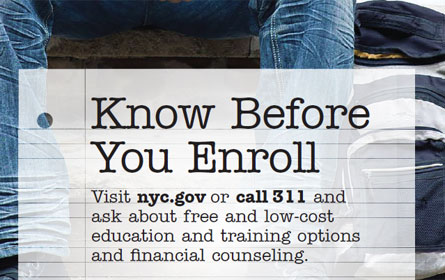
In a stagnant economy and a competitive job market, the prevailing wisdom tells unemployed workers to return to school to obtain new skills.
But in recent years, many New Yorkers have been punished for doing just that; namely, some of the over 130,000 who enroll in for-profit schools in the city each year.
A city government campaign called "Know Before You Enroll," sponsored by the Department of Consumer Affairs, the Department of Education, and Mayor's Office of Adult Education, aims to warn New Yorkers against the dangers of some such schools.
"I signed up for nursing school and paid $6,000," says 'Paula from Brooklyn' in one of the ads from this campaign, which is featured in subway cars, bus shelters, and newspapers throughout the city. "Ten months later, I found out the school wasn't licensed and the Attorney General shut it down. My dream is shattered and I'm in debt."
Just feet from these campaign posters appear ads for the very schools the city seeks to warn against. Combination GED and associate degree programs, unlicensed and unaccredited schools, and vocational courses that offer "guaranteed job placement."
Sign of the Times
For-profit schools in New York City cost attendees an average of $4,700, according to a survey by the Better Business Bureau.
But even though they're more expensive than their public counterparts, these for-profit or "proprietary" schools have become more popular in recent years.
“Unfortunately, difficult economic times sometimes draw out those who would take advantage of vulnerable New Yorkers,” said Department of Consumer Affairs Commissioner Jonathan Mintz.
Those vulnerable populations include low-income communities where language or literacy barriers obscure the processes associated with enrolling in school, Mintz said.
That is what happened to Garvin, a 26-year-old Brooklyn resident who attended a two-year Associate’s degree program that advertised on television. Only after completing that degree, to the tune of $25,000, did Garvin find out that his credits wouldn't transfer to the City University of New York, where he planned to finish his undergraduate education. To obtain his bachelor's degree, Garvin would have to start college all over again.
It's a Spectrum
Schools like Garvin's Associate's program are deliberately misleading, and survive by preying on unsuspecting students.
But not all for-profit schools are predatory, Commissioner Mintz is careful to note. Defenders of for-profit schools praise their equal-opportunity accessibility; since many have little or no academic criteria for acceptance, they offer options for students who might not otherwise qualify for any sort of higher education.
"These schools exist on a spectrum," Mintz said. At one end of that spectrum, he believes, decent for-profit schools operate with proper accreditation, and bestow degrees and certificates of value. At the other, schools operate in a realm that is plainly illegal.
The programs in the middle of this spectrum pose the greatest challenge to regulators and students, he said.
"In the middle, you have schools that are licensed but aren't delivering what they're promising, aren't delivering value," Mintz said. "What they're doing is taking yet more dollars from people who are trying to better their situations."
The problem is, there's a pretty huge middle. To address the glut of these legal-but-not-quite-legitimate schools, the "Know Before You Enroll" campaign has set up a hotline to cull complaints from New Yorkers about specific schools and training programs. The city will forward those complaints on to the state Department of Education and the office of the Attorney General.
Regulation
Any action taken against these predatory schools would fall to state agencies; when it comes to their regulation, the city has no authority. The same goes for reform. Stricter policies around licensing and accreditation, loans, and consumer protection, all rely on the legislature up in Albany.
In the meantime, the state has the power to shut down schools found operating without licenses. But that doesn't mean they always do. Like any state agency, the Department of Education, the State Board of Regents, and the attorney general's office all have to prioritize. This campaign may not top their lists.
But for what its worth, the city plans to help them raise some funds. "We're working with the state, helping secure them resources so they can investigate," said Tara Colton, the Executive Director of the Mayor's Office of Adult Education.
And for its own part, the City went the educational route, borrowing a page from its adversary's own playbook and plastering the subways with anecdotal posters that advertise a better, smarter way.
Education and Budgeting
The campaign's main thrust boils down to a list of tips. In addition to the advice to be suspicious of employment guarantees, these include the classics: avoid unlicensed schools; do your research; don't sign up on the spot.
As for the unlucky New Yorkers who have already been prey to these "predatory" schools, there's a service for them too. The city offers free one-on-one financial counseling.
"They'll get on the phone with creditors and negotiate payment plans," said a spokesperson for the Department of Consumer Affairs.
So far, she said, those counselors have saved their clients over $6.5 million.